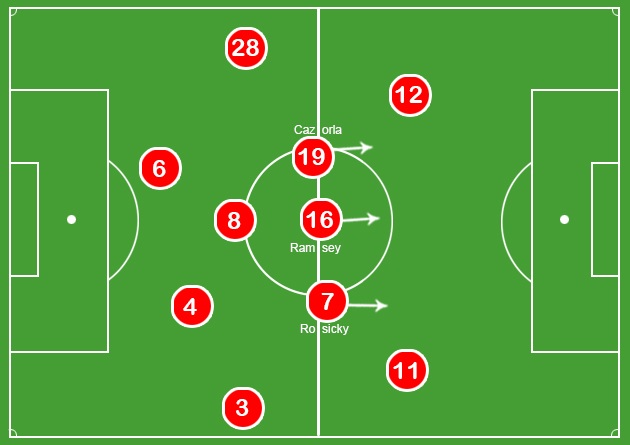Premier League Scouting Report: Mikel Arteta & Arsenal's Strategy vs. Liverpool
on November 4, 2013
 Ian Walton/Getty Images
Ian Walton/Getty Images
Welcome to the latest edition of our
Premier League scouting reports, where we take an analytical look back
on the weekend's action and pick out one performance of note.
We've covered Andros Townsend and Olivier Giroud in the past, and in
keeping with the North London theme, here's a glance at Mikel Arteta and
Arsenal's magnificent midfield.The Basics
On paper, Arsenal were set out in a 4-2-3-1 formation to tackle Liverpool's 3-5-2.
They had the numerical advantage in the centre of the park (three vs. two) but lacked a spare man in the defensive line as both Per Mertesacker and Laurent Koscielny were consistently occupied with Luis Suarez and Daniel Sturridge.
The game appeared ferocious, frantic; an end-to-end spectacle truly worthy of the world's gaze, and that's down to the fact that the tactical battle took place in quick transitions and counterattacks.
Before the game, if you were told that's how the 90 minutes would play out, you'd have expected Liverpool to win. But Arsene Wenger devised a perfect plan to limit the Reds' threat on the reverse.
Classic Stopper-Sweeeper Combo
Arteta's starting position was as deep as you'll see for a long time. It was so deep it was hardly even a midfield-pivot; so deep it was almost impossible to get in behind him.

Mertesacker and Koscielny played a classic stopper-sweeper combination, with the German rushing forward to pressure Suarez when he received any longer, 15-yard-plus passes from his own deep midfielders.
Koscielny guarded the space in behind, and Mertesacker was consistently moving into areas that Arteta, Ramsey and Tomas Rosicky were in. Suarez was outnumbered a whopping five vs. one at times, nullifying his impact and, therefore, his linkup play with Sturridge.

When Per rushes, Kosc's first thought: "locate Sturridge"
Half-Back-esque?
The central defensive line came into play when the ball was fizzed between the lines quickly, but when Brendan Rodgers' troops chose to move the ball slowly, Arteta's positioning was near-perfect at all times.
On the ball he was formidable too, completing 100 passes on the dot, with 99 of them being classed as "short" by the FourFourTwo StatsZone and just half of them going forward.
There was one point in the first half where Arteta passed the ball and moved forward ahead of play. He was met with screams from the bench to get back behind the ball, signalling Wenger's genuine intention to marginalise him completely in an attacking sense.

Arteta blocks Gerrard's back-heel into Suarez
Moving Forward, the "Third Runner"
Wenger's lineup, on paper a 4-2-3-1, morphed into something quite strange when counterattacking Liverpool.
Rosicky and Santi Cazorla were dropping extremely deep to help press and harry, Arteta was holding his line just five yards ahead of the defence and Ramsey was just five yards ahead of him.
Mesut Ozil and Olivier Giroud, originally centre-forward and right-winger for the game, then pulled apart and played as wide forwards, allowing the Gunners to move into a diamond-esque shape with no traditional forwards.
As the team moved forward it would straighten itself out, but in the initial stages of attack this shape was key to utilising Ramsey's box-to-box potential.

The third runner is difficult to deal with, and he can often make or break games. In truth Rodgers' 3-5-2 is the ideal formation to nullify it—one centre-back can venture forward to meet him early, leaving two in behind—but the defenders refused to budge from their line of three.
Ramsey, tearing forward, gave Liverpool fits as he's too athletic for the likes of Gerrard and Lucas Leiva to deal with. Rosicky and Cazorla would steam forward to occupy markers, clearing a path for the runner.
The Crucial Difference
Tactics don't always win matches. A goal can come from anything, be it a lucky deflection or a corner kick routine. But tactics can be indicative of the battle swinging one way and not the other, and that's exactly what happened here.
In the first half, Arteta had perhaps his only poor moment in the game, finding himself in a foot race due to Jordan Henderson's dispossessing of Cazorla in an advanced area.
Liverpool's game plan becomes extraordinarily clear here, as while "Hendo" is surging forward centrally, Suarez pulls Mertesacker to the left and Sturridge pulls Koscielny to the right.
The commentator screams "it's opened up here!" as Henderson drives straight into the space where you would usually find a centre-back or two, and Arteta inexplicably fails to drop sharply enough to fill the void.

First priority: fill the gap between Henderson and the goal
That run is the same run Ramsey makes—Henderson is the third runner—and the only difference is that the Welshman is in red-hot form and makes them count.




0 comments:
Post a Comment